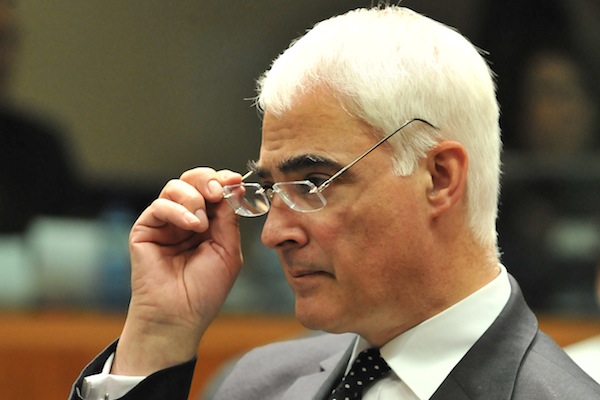‘Unless you do something now it will be years before we recover.’ This morning those words come from former chancellor Alistair Darling in an open letter to George Osborne, but they could just as easily be from a member of his own backbench, or from Boris.
Darling’s letter, published in the Sunday People, accuses both Mr Osborne and the Bank of England of having ‘given up on any plan for growth’. ‘Your policies since 2010 simply haven’t worked, you need another plan – call it plan B, call it whatever you like,’ he writes. He’s essentially saying the same thing as Boris Johnson did this week, but using slightly more polite words than ‘pussyfooting’: expansion of London’s aviation capacity, more houses, replacing power stations and investment in rail. He also calls on the Bank to halt quantitative easing, clearly worried as Coffee House readers are that it is pumping more money into the economy without regard to how effective – or even damaging – this policy is.
Darling does not, of course, mention the tax cuts and regulatory reform that Osborne’s colleagues in the Conservative party are pushing for. But neither does he call on the Chancellor to change course on deficit reduction. The economists who featured in the New Statesman’s story urging Osborne to change course didn’t say this either, incidentally. As Andrew Lilico pointed out on ConHome, the letter the 20 had originally signed in the Sunday Times said the government should ‘eliminate the structural current budget deficit over the curse of a Parliament, and there is a compelling case, all else equal, for the first measures beginning to take effect in the 2010/11 fiscal year’. The responses the Staggers received followed the Darling plan of increasing capital spending – which is not the same thing as current spending and therefore does not affect the structural current deficit (it’s worth reading the excellent guide that Pete wrote on this back in March) – with respondents such as Tim Besley recommending ‘more focus on housing in the near term’.
It might be just as well for Osborne that a focus on housing is one of the measures he has planned for this September, with plans to reform planning laws and relax the section 106 agreements that are stifling the progress of development in some instances. But as Darling points out, it could be years before Britain’s economy recovers unless the Chancellor gets stuck in right now. The Communities and Local Government department is not enthusiastic about further extensive planning reform. The Liberal Democrats are opposed to expansion of London’s airports, and will debate a motion restating that opposition at their autumn conference, while the Conservative party is hardly united on what a solution would be. These are significant obstacles that Osborne has to overcome if he is to push an effective plan for growth. Tory backbenchers are increasingly citing the cost of living and welfare as the main battlegrounds for the next election as they fear they will not be able to wave economic success at hustings. Some suspect it is already too late for something to come up by 2015.







Comments